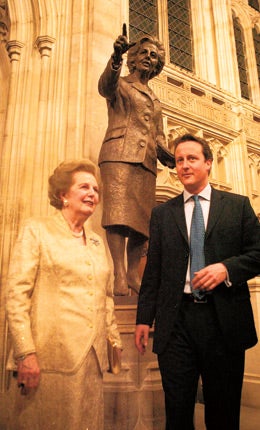Andrew Grice: Invoking Thatcher may come back to haunt Cameron in the future
Inside Westminster

As David Cameron entered the Commons chamber for Prime Minister's Questions on Wednesday, an aide tipped him off that in one of the 250,000 American diplomatic cables published on the WikiLeaks website, William Hague had described the Tory leadership as the "children of Thatcher".
It was good advice, as Labour leader Ed Miliband had decided to play the Thatcher card by quoting Mr Hague's attempt to reassure US officials before the May election. Mr Cameron had a few minutes to think up a response. He is a quick thinker. "I would rather be a child of Thatcher than a son of Brown," he said. Euphoria on the Tory benches. Glum faces on Labour's.
It capped a good performance by the Prime Minister and a poor one by Mr Miliband. The Labour leader decided not to shoot at the open goal offered by the WikiLeaks material: the pre-election doubts that Mervyn King, the Governor of the Bank of England, had expressed about Mr Cameron and George Osborne. Instead he raised eyebrows, including those of Labour MPs, by citing this week's report from the fiscal watchdog, the Office for Budget Responsibility, even though it was broadly favourable about Mr Osborne's strategy. Why? He wants to use PMQs to speak to people beyond his party, and the economy is obviously the central issue of the day.
The Labour leader believes the Prime Minister's short-term tactical victory will prove a mistaken strategy in the long run. He is convinced that Mr Cameron's admission that he was a "child of Thatcher" will return to haunt him.
Peter Hain, the shadow Welsh Secretary and a close ally of Mr Miliband, told BBC2's Newsnight programme that Mr Cameron's "confession" would be "hung round his neck at the next election". Mr Hain argued: "He has tried to claim that this new shiny progressive Liberal-Conservative Government is something different from Thatcher's attacks on people – the mass unemployment, the cuts, the desolation in communities. Now we find out it is the same old policy being repeated."
Team Miliband judges that in better economic times, a politician who associates himself or herself with Lady Thatcher might be perceived as a "good radical". But at a time of spending cuts and economic fragility, it believes, she reminds many voters of the harsh economic liberalism of her era, encapsulated by Norman Lamont's 1991 dictum that unemployment is "a price worth paying".
Although it suited Mr Cameron to be a "child of Thatcher" on Wednesday, that hasn't always been the case. Indeed, the Cameroons get pretty miffed when people like me suggest that the Coalition Government's radical reforms to health, education and welfare would complete the unfinished business of the Thatcher revolution.
For Mr Cameron, the Thatcher connection can be a double-edged sword. He has been happy to talk about it to a friendly Tory audience. "The reduction of Thatcherism into a sort of laissez-faire libertarianism does not do justice to her record," he wrote in the Daily Telegraph in 2007. "She was animated by a vision of the good society."
And yet, without attacking Lady Thatcher directly, he managed to distance himself from her when he was wooing liberal voters. "There is such a thing as society – it's just not the same as the state," was his message to them, a rejection of Lady Thatcher's "no society" mantra. But it didn't reassure enough voters worried about his party being "the same old Tories" to give him an overall majority.
To view the Government's public service reforms as a logical conclusion of Thatcherism is not the same as saying Mr Cameron is a Thatcherite. He is not. I am told that Lady Thatcher would not have entered a full-blown coalition with the Lib Dems if she had found herself in Mr Cameron's position, preferring to soldier on as a minority government until a second election. Mr Cameron looks entirely at ease in the Coalition. His social liberalism and Nick Clegg's economic liberalism make a happy marriage, even if some of their backbenchers and grassroots members do not approve.
Of course, the Liberal Democrats offer Mr Cameron a useful insurance policy against charges that the deep spending cuts show his party is reverting to Thatcherism. Although Mr Clegg is becoming public enemy number one over university tuition fees ahead of next Thursday's Commons vote, it would be silly to accuse the Lib Dems of being crypto-Thatcherites. Mr Clegg campaigned against many of the Thatcher Government's policies while he was at university. Danny Alexander, the Lib Dem Chief Treasury Secretary and a deficit hawk, says Lady Thatcher inspired him to enter politics – so he could oppose her. What do the public think of her now? It seems the nation is as divided as ever. A YouGov survey last year found that 40 per cent believe she made Britain better and 41 per cent worse.
Mr Cameron and Mr Miliband may have more in common than they care to admit. Their parties' natural supporters will have a clear view of Lady Thatcher. What they both said on Wednesday was preaching to the converted rather than reaching out beyond their own tribe (in Mr Miliband's case, contradicting his strategy for PMQs).
Twenty years after she was deposed by her own party, Lady Thatcher still manages to make waves and set the terms of political trade.

Join our commenting forum
Join thought-provoking conversations, follow other Independent readers and see their replies